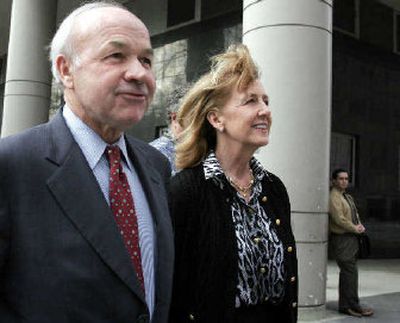Lay, Skilling eager to take stand

HOUSTON — The highly anticipated testimony from the former top two leaders of scandal-choked Enron Corp. could be the only hurdle between them and vindication or prison.
Once Enron founder Kenneth Lay and former Chief Executive Jeffrey Skilling testify in their fraud and conspiracy trial, experts say the focus of the case becomes whether jurors believe them. Even heavy hitters from the government’s case, which rested Tuesday after eight and a half weeks, fall into their shadow.
“When Lay and Skilling take the stand, the case will shift from whether the government has met its burden of proof and proven its case to just flat-out ‘Did they do it?”’ said Michael Wynne, a former federal prosecutor who has observed much of the trial firsthand.
But he added that observers aren’t likely to see any “You can’t handle the truth!” outbursts, such as that from Jack Nicholson playing an Army colonel baited during cross-examination in the 1992 film, “A Few Good Men.”
“You won’t see them blow up on the stand, nor will the government bait them,” Wynne speculated. “It’s going to be much more deliberate and meticulous.”
The government’s 22 witnesses featured eight ex-Enron executives who have pleaded guilty to crimes, one of whom is already serving a prison term. The others included three former executives who voiced concerns to no avail about massive losses or the appropriateness of financial structures backed by Enron stock, which were used to warehouse poor assets and investments.
None of the witnesses, including former Chief Financial Officer Andrew Fastow, who ran schemes that helped undercut Enron’s strength, dealt clear death blows to the defendants. Nor did prosecutors present any obvious “gotcha” documents or e-mails pointing directly to the defendants’ guilt.
Instead, the government intended each witness to build on the others’ recollections of private meetings or conversations regarding hidden losses or accounting tricks to bolster prosecutors’ contention that Lay and Skilling knew of serious financial troubles when they told investors and employees the company was strong.
“That’s how we did business at Enron,” Fastow testified regarding the lack of a paper trail.
The defense aims to present a different story, told mostly by Lay and Skilling.
Both now face fewer criminal counts because U.S. District Judge Sim Lake approved the government’s request to drop three counts against Skilling and one against Lay, for which prosecutors presented no evidence and to streamline their case. Skilling now faces 28 counts of fraud, conspiracy, insider trading and lying to auditors, and Lay faces six counts of fraud and conspiracy.
Their lawyers told jurors when the trial began that there was no fraud at Enron other than Fastow and some of his minions skimming millions of dollars from schemes behind the top two executives’ backs. They blamed bad publicity coupled with plummeting market confidence for the energy trading company’s swift descent into bankruptcy proceedings in December 2001.
“This is a somewhat different case in that they have a theory of their own. They’re not just saying the government failed to prove their case, they’re saying ‘We have a story to tell and it’s a completely different story than the government told,”’ said Sam Buell, a former federal prosecutor with the Justice Department’s Enron Task Force who is a visiting professor at the University of Texas School of Law.
Skilling will be the first of the two to testify, and he could do so as early as next week as the defense teams continue whittling their witness list, said his lead trial lawyer, Daniel Petrocelli.
Skilling, 52, has been shown by some of the government’s evidence to speak his mind and display a temper.
During a March 2001 conference call with analysts intended to quell rumors of troubles at Enron, Skilling started off telling participants he had just arrived in Houston from a trip to South America hours earlier and was in “a really lousy mood.” In a quarterly earnings call the next month, he responded to a hedge-fund worker’s complaint that Enron’s disclosure of results lacked sufficient financial detail by calling him an obscene name.
If Lay, 63, testifies right after Skilling, he could take the stand sometime in the second week of April if the former CEO gets his turn next week as Petrocelli expects.
Both are anxious to address jurors, whose view of their truthfulness matters most.
“I’m sorry I’ve come to this trial, but delighted to have the chance to tell our story,” Lay said.